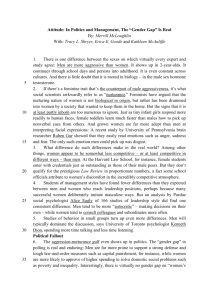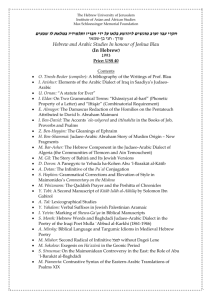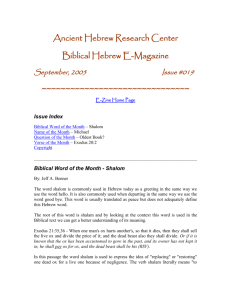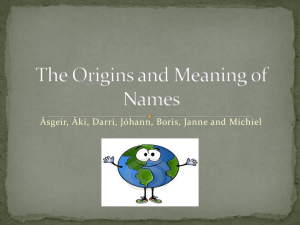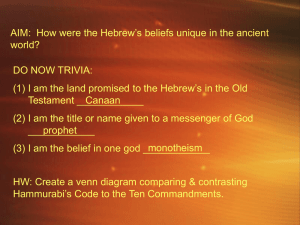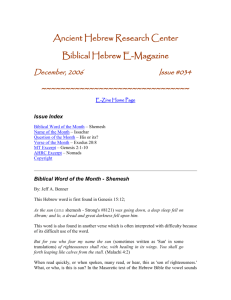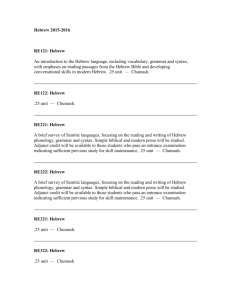Biblical Hebrew E-Magazine - Ancient Hebrew Research Center
advertisement
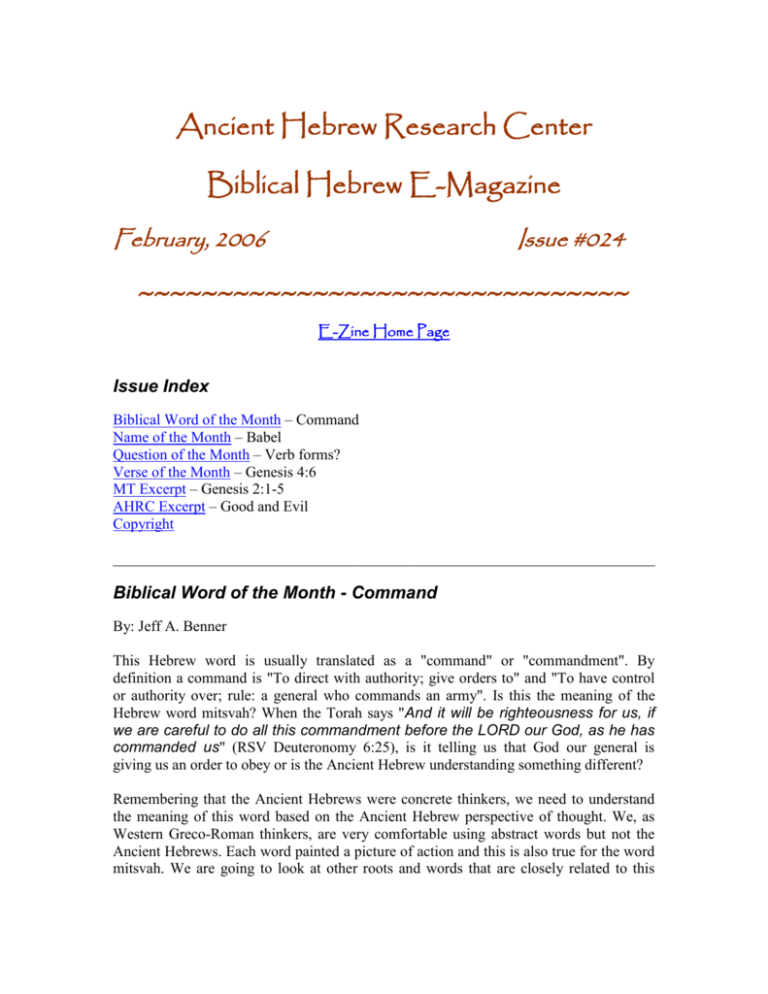
Ancient Hebrew Research Center Biblical Hebrew E-Magazine February, 2006 Issue #024 ~~~~~~~~~~~~~~~~~~~~~~~~~~~~~~~ E-Zine Home Page Issue Index Biblical Word of the Month – Command Name of the Month – Babel Question of the Month – Verb forms? Verse of the Month – Genesis 4:6 MT Excerpt – Genesis 2:1-5 AHRC Excerpt – Good and Evil Copyright ________________________________________________________________________ Biblical Word of the Month - Command By: Jeff A. Benner This Hebrew word is usually translated as a "command" or "commandment". By definition a command is "To direct with authority; give orders to" and "To have control or authority over; rule: a general who commands an army". Is this the meaning of the Hebrew word mitsvah? When the Torah says "And it will be righteousness for us, if we are careful to do all this commandment before the LORD our God, as he has commanded us" (RSV Deuteronomy 6:25), is it telling us that God our general is giving us an order to obey or is the Ancient Hebrew understanding something different? Remembering that the Ancient Hebrews were concrete thinkers, we need to understand the meaning of this word based on the Ancient Hebrew perspective of thought. We, as Western Greco-Roman thinkers, are very comfortable using abstract words but not the Ancient Hebrews. Each word painted a picture of action and this is also true for the word mitsvah. We are going to look at other roots and words that are closely related to this Biblical Hebrew E-Magazine word and its roots and all of them when combined will paint a very clear picture of action which is completely lost in the English translations of the Bible. The parent root ( צוtsav) means "direction". From this parent comes the child root צוה (tsavah) meaning "to direct". From this child root comes the word ( מצוהmitsvah) also meaning a "direction". The parent root ( צאtsa) means "excrement" in the sense of "going out". From this parent root comes the child root ( צואyatsa) meaning "to go out". From this child root comes the word ( מצואmotsah) meaning a "going out" or to "proceed". The parent root ( ציtsiy) means a "nomad" or "ship" (as a nomad on the sea). From this parent root comes the word ( צייtsiyiy) meaning a "desert" and ( ציוןtsion) meaning a "sign". At first glance these three sets of roots do not appear to have anything in common that is until we see these words through Hebrew eyes. The action painted by the parent root צי (tsiy) and its related words, is the landmarks (signs such as mountains, ranges, wadis, rock outcroppings, etc) of the desert are used by the nomad to follow to the next encampment, pasture or water hole. The action painted by the parent root ( צאtsa) and its related words, is the migrations of the nomad through the desert. The action painted by the parent root ( צוtsav) and its related words including the word mitsvah, is the directions taken by the nomad by following the landmarks through the desert. Getting back to our word ( מצוהmitsvah) we need to read this word as a "direction" one is to take in their migration. Our life is a journey through the desert and in this life we are given landmarks or signs which guide us in this journey. The Torah, the Bible, the words of God is these landmarks. When God says "honor your father and mother" he is giving us a landmark which gives us a direction to go. If we follow each of these landmarks we will not become lost in our journey and will arrive at the ultimate landmark - Zion. The word Zion is ( ציוןtsion) in Hebrew and is the very same word we looked at previously meaning a "sign" or "landmark". ________________________________________________________________________ Name of the Month - Babel By: Jeff A. Benner To most people the name Bavel (or Babel) is only known to us as the name of the city where God confounded the languages. Therefore its name was called Babel, because there the LORD confused the language of all the earth; and from there the LORD scattered them abroad over the face of all the earth. (Genesis 11:9). Whenever a Hebrew name is given in the text and followed by the word "because", the text is providing the connection between the name and the reason for the name. In this case the word "confused" is the Hebrew word ( בללbalal) meaning to be mixed up and it 2 Biblical Hebrew E-Magazine was here that God "mixed up" the languages. Interestingly the name ( בבלbabel) is a mixing up of the letters from the word ( בללbalal). While we may only be familiar with this place name as Babel as found in Genesis, this name is used 262 times throughout the Biblical text. But, instead of translating this name the same way all the time, the translators have chosen to translate it as "Babylon" in all its other occurrences. Yes, Babel and Babylon are one and the same place; Babylon is the place of confusion. In our English language we also have the word babble meaning "To utter a meaningless confusion of words or sounds", a clear connection between Hebrew and English. _______________________________________________________________________ Question of the Month – Verb forms? By: Jeff A. Benner Q: What are the different forms of Hebrew verbs? A: Hebrew verbs have seven different forms - qal (simple active), niphal (simple passive), hiphil (cuasative active), hophal (causative passive), hitpa'el (simple reflexive), piel (intensive active) and pual (intensive passive). Each form slightly changes the application of the verb as will be demonstrated with the verb "to cut" in the third person, masculine. The qal form is simply "he cut". The niphal form would be "he was cut". The hiphil form would be "he made cut". The hophal is "he was made cut". The piel is "he slashed". The pual is "he was slashed". A good Lexicon or dictionary such as Benjamin Davidson's Analytical Lexicon is very helpful in identifying these different forms in Hebrew verbs. A dictionary such as Strong's can be a little misleading. For example the verb ra'ah (Strong's number 7200) states that this word can mean "see" or "appear" but this is a little misleading. The word ra'ah means "to see" but when used in the niphal form it would be "was seen" which means "to appear". Thayer's dictionary is a little more helpful as it provides the different meanings based on the form of the verb. ________________________________________________________________________ Verse of the Month – Genesis 4:6 By: Jeff A. Benner ל־קיִן לָ מָ ה ָח ָרה לְָך וְ ָל ָמה נָפְ לּו פָ נֶיָך׃ ָ וַי ֹּאמֶ ר יְ הוָה ֶא And Jehovah said unto Cain, Why art thou wroth? and why is thy countenance fallen? (ASV) 3 Biblical Hebrew E-Magazine ( ַוי ֹּאמֶ רvay-yo-mer) The base word is ( אמרamar) meaning "to speak". The prefix ( יy) identifies the verb as third person, masculine, singular, imperfect tense and would be translated as "he will say" or "he says". The prefix ( וv) means "and" and when prefixed to a verb often reverses the tense, in this case from imperfect to perfect tense and would be translated as "and he said". ( ְיהוָהYHWH) The name of God, transliterated in different ways including Yahweh/Yahu'eh, Yehovah, etc. ( ֶאלel) This word means “to” or “toward.” ( ָקיִןqa-yin) The name Qayin, usually transliterated in most translations as Cain (Translators relied more on the Greek Septuagint translation when translating the Hebrew text, the Greek transliteration of this Hebrew name is Kain). ( לָמָ הla-mah) The base word is ( מהmah) meaning "what". The prefix ( לl) means "to" or "toward". When this prefix and word are put together they would be translated as "to what" but meaning "why". ( חָ ָרהhha-rah) This is a verb meaning to flare up with great anger". Because no prefixes or suffixes are added to the verb the verb is third person, masculine, singular, perfect tense and would be translated as "he flared up with great anger". ( ָלְךlakh) The ( ךl) is the prefix meaning "to" or "toward" and the ( ךk) is a suffix meaning "you". When combined these mean "to you" or "toward you". ( וְ לָמָ הve-la-mah) The ( למהle-mah) is the same as above meaning "why". The ( וv) is the prefix meaning "and". ( נָפְ לּוnaph-lu) This is the verb ( נפלnaphal) meaning "to fall". The suffix ( וv) identifies the verb as third person, masculine, plural, perfect tense and would be translated as "they fell". (The "they" is the subject of the verb and is identified in the following word) 4 Biblical Hebrew E-Magazine ( ָפנֶיָךpa-ney-kha) The base word is the noun ( פנהpaneh) meaning face, but this word is always written in the idiomatic plural form ( פניםpaniym). The ( ךk) is a suffix meaning "of you". When a plural word such as this includes a suffix the ( םm) is dropped from the word. This word would then be translated as "faces of you" or "your face". Note: The last two words form the phrase "your face fell" and is an idiom meaning "you are sad". The following is a literal rendering of this verse from its Hebraic meaning. And Yahweh said to Qayin "why are you angry and why are you sad?" ________________________________________________________________________ Mechanical Translation Excerpt - Genesis 2:1-5 1 and the sky and the land and all their armies were finished 2 and the powers finished in the seventh day his occupation which he did and he ceased in the seventh day from all his occupation which he did 3 and the powers knelt to the seventh day and he set him apart given that in him he ceased from all his occupation which the powers fattened to do 4 these are the birthings of the sky and the land in their being fattened in the day Yihweh of the powers did land and sky 5 and all the shrubs of the field before existing in the land and all the herbs of the field before springing up given that Yihweh did not make it precipitate upon the land and without a human to serve the ground 6 and a mist will go up from the land and he will make all the face of the ground drink 7 and Yihweh of the powers molded the human of powder from the ground and he exhaled in his nostrils a breath of life and the human existed for a being of life 8 and Yihweh of the powers planted a garden in Eden from the east and set in place there the human which he molded 9 and Yihweh of the powers made spring up from the ground all trees being a craving to appearance and functional for nourishment and a tree of the life in the midst of the garden and a tree of the discernment of function and dysfunction 10 and a river going out from Eden to make the garden drink and from there he will be divided apart existing to four heads 11 the character of the one is Pishon the one surrounding all the land of the Hhawilah which there is the gold 12 and the gold of that land is functional there is the amber and the stone of the shoham 13 and the character of the second river is Gohhon he is the one surrounding all the land of Kush 14 and the character of the third river is Hhideqel he is the one walking eastward of Ashur and the fourth river he is Perat 15 and Yihweh of the powers took the human and he caused him to be deposited in the garden of Eden to serve her and to guard her For details on this new translation see the web site at http://www.mechanical-translation.org _______________________________________________________________________ 5 Biblical Hebrew E-Magazine AHRC Website Excerpt – Good and Evil Very few sermons in our Western synagogues and churches would include the passage "I [God] form the light and create darkness, I make peace and I create evil, I am the LORD who does all of these" (Isaiah 45:7) as our Western mind sees these two forces as opposing opposites while the Eastern mind sees them both as equals and necessary for perfect balance. In the Western mind, God is only good and therefore unable to create evil. The Eastern mind sees God as a perfect balance of all things including good (tov in Hebrew) and evil (ra in Hebrew). It should be noted that the English word "evil" has no Ancient Hebrew equivalent, while most English translations will use the word "evil" it is usually the Hebrew word "ra" which simply means "bad". In the Ancient Hebrew mind there is no such thing as an "evil" person or thing. To understand the words "good" and "bad" from a more Hebraic understanding these words should be understood as "functional" and "dysfunctional". God is both functional (such as seen in the Creation story of Genesis one) as well as dysfunctional (such as the destruction of the flood). Our western mind classifies all things in two categories, either it is "good" or it is "bad". One is to be sought, cherished and protected, the other is to be rejected, spurned and discarded. Let us take light and darkness as an example. We see light as good and darkness as bad. The idea of light brings to mind such things as God, truth and love. Darkness on the other hand invokes Satan, lies and hate. To the Orientals, including the Hebrews, both are equally necessary as one cannot exist without the other. In the Bible God is seen as a God of light as well as darkness “And the people stood at a distance and Moses approached the heavy darkness where God was.” (Exodus 20:21). If you stare at the sun, which is pure light, what happens? You become blind. If you are standing in a sealed room with no light, what happens? You are again blind. Therefore, both light and darkness are bad and yet, both are good. In order to see we must block out some of the light as well as some of the darkness. The two poles of a magnet are north and south. These two poles create balance; they are not morally good or bad, but necessary ingredients of physics that complement each other. Good and bad are more like the north and south poles of a magnet than our Western conception of good and bad. Can good exist without the bad? Absolutely not, how could you judge something to be good if you cannot compare it to something bad? The same is true for all other concepts. Cold cannot exist without heat, or short without tall, far without near, or large without small. Our western mind usually ignores these extremes and seeks to always find the "good" or the “bad”. The Eastern mind is continually seeking both the "good" and the "bad" in order to find the balance between the two. Even Solomon recognized this when he said “Do not be overly righteous” (Ecclesiastes 7:16). 6 Biblical Hebrew E-Magazine Throughout the scriptures this search for balance is found, yet ignored by Westerners who do not understand the significance of balance. This article is located on the web site at http://www.ancient-hebrew.org/12_goodbad.html ________________________________________________________________________ Copyright © 2006 Jeff A. Benner Ancient Hebrew Research Center Please feel free to use, copy or distribute any material within the "Biblical Hebrew E-Magazine" for nonprofit educational purposes only. ________________________________________________________________________ 7



